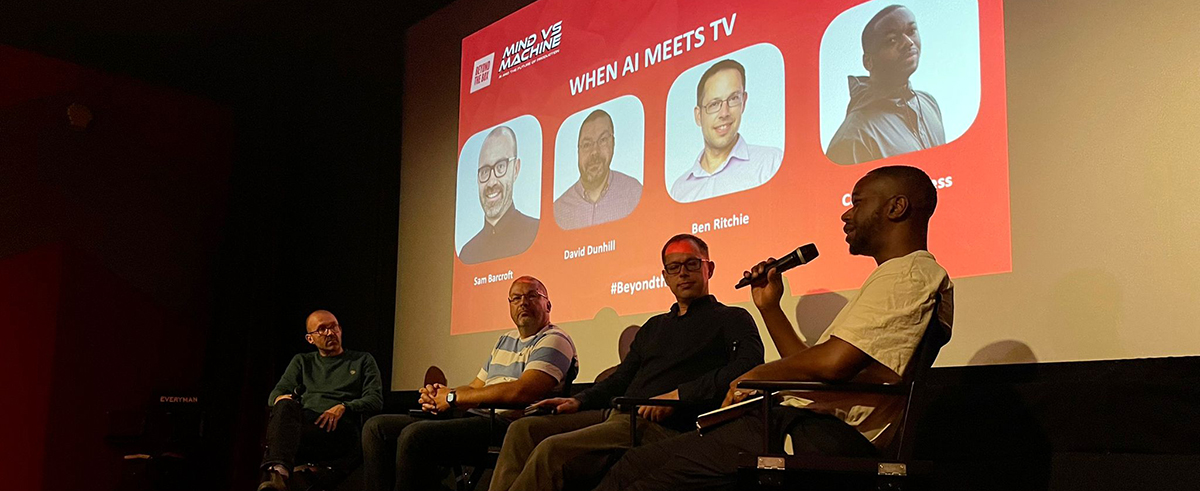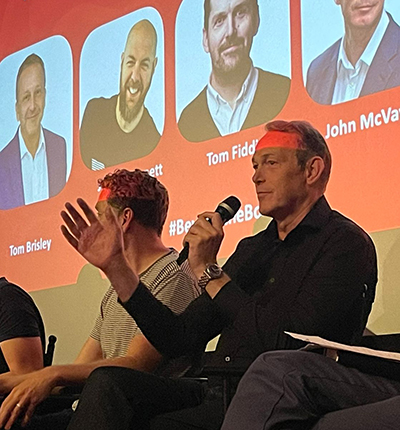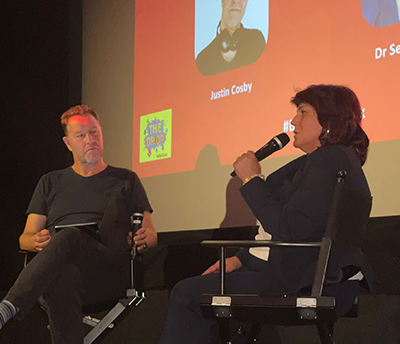
In September 2023, we held a day-long conference all about AI and the future of production featuring an array of expert speakers who shared their knowledge and insights.
Below is a write-up of key takeaways from the event.
It's not just about the tech, it's about the people too.
6 top take aways
1. AI can’t be trusted... yet
“The danger is, it’s rubbish in, rubbish out, rubbish all about,” so said News Corp CEO Robert Thomson earlier this month, and it was a point reiterated throughout the Summit.
From the very first panel, which focused on where we are with AI presently, it was emphasised that the responses of tools such as ChatGPT are only as good as the data they are based upon.
David Dunhill, MD of Social Media Makes Sense highlighted that the technology is still in its infancy and makes simple errors, such as getting dates wrong or stating inaccuracies as fact.
Because AI tools are simply ‘scraping’ the internet (which itself is full of inaccurate information, in case you hadn’t noticed), there’s no quality control. Put simply by the panel moderator, Sam Barcroft: "We can't trust AI at the moment."
Later in the day, former iPlayer lead and now AI expert Dan Taylor-Watt suggested that Large Language Models (LLMs), like ChatGPT, are better as an input and creative stimulus, rather than as an output. Don’t use them to try to get accurate data because that’s not their strength.
In the final session of the day, Little Dot Studios’ Alex Hryniewicz said that through his own team’s experiments with AI, they found that around 30% – 40% of results it threw out were inaccurate.
This means that having checks and balances in place remains incredibly important. (I can confirm this to be true, having placed my notes from Beyond the Box into Bard and, asking it to suggest some key points for an article to be shared online, I was presented with some very interesting but completely unrelated information about a fictional summit with key points all related to climage change!)
However, fact checking and greater accuracy will no doubt be part of AI’s evolution, so in time it’s hoped that the issues around reliability will become a thing of the past.
AI won't take your job, but someone who knows how to use it will.
2. AI is a co-pilot, not a human replacement
Another point which kept cropping up was that AI should be seen as a co-pilot, a creative partner, a productivity tool. You have to have an eye for creativity to make AI be creative, which should be reassuring.
A number of times different speakers referenced the quote that “AI won't take your job, but someone who knows how to use it will.” Which is why it’s important to engage with AI tools and use them to enhance the work you are doing (more on that to come).
Cassie Quarless, Director/Producer and author of AI For Film & TV, summed it up nicely when he said: "It's a technology that allows us to punch above our weight." Whilst Ben Ritchie, Chief Technology Officer of Noah Media Group added "[AI is] a partnership between the human and the computer."
In the panel focusing on AI’s impact on music for film and TV, Head of A&R and Music Composer for The Nerve Media Group, Mark Fabian explained he doesn't use AI to actually create sound, but uses it as "an analysis tool", to analyse existing music and create a starting point for a new composition.
Later, Dan Taylor-Watt suggested that indies could start to create some AI guidelines for their teams, to allow scope to play with the tools whilst still being responsible.
3. AI is enhancing the commissioning process – on both sides!

Pact CEO, John McVay OBE
Several speakers are already using AI tools to enhance their pitches. For example, Cassie uses MidJourney, which generates images from text prompts, to help him create visual references for his pitch materials, saying he feels it's possible to create original images with AI that can convey your ideas better than any existing image may be able to.
Zig Zag Productions CEO, Danny Fenton, who moderated a session with ITV Studios’ Helen Killeen (Director of Production Non Scripted UK) and Rob O’Brien (Head of International Technology) said commissioning used to be more of an art than a science, but increasingly feels like it’s becoming more of a science than an art, which AI can help producers with.
As well as indies being able to use AI tools to enhance their idea generation processes and pitching assets, commissioners are also using AI to analyse large datasets and influence their decision-making.
Moderating the final panel of the day, Arrow Media Co-founder and Creative Director, Tom Brisley raised a concern that broadcasters and funding bodies may use the increased efficiencies from AI to squeeze producers’ margins further. Pact CEO John McVay acknowledged the point and then turned it back on the commissioners, calling on them to use AI in their own organisations to create efficiencies which can then lead to the savings being put into content production.
It was generally agreed that AI would make the industry more competitive – putting hugely powerful tools (that in the past would have been out of reach for smaller indies) into the hands of all. But it’s ultimately how you use those tools to bring ideas to life that will still set you apart.
4. AI brings with it huge potential for time and cost efficiencies
This may be stating the obvious, as numerous AI tools are already helping indie producers and companies across the film and TV industry to make time and cost savings.

Dr Sepi Chakaveh and Justin Crosby
Littledot’s Alex Hryniewicz suggested producers look at every aspect of their current workflows and consider how AI can help to improve them, both now and in the future. Even in the short term you can probably find things that can save you time and money, such as automatic logging, which will help you to stay ahead.
Dr Sepi Chakaveh, CEO and Founder of Pixsellar, shared details of her current project – Pixel Chat – which can translate content into over 100 different languages in real time, and can even use a cloned version of the original voice in some languages. The time and cost savings on what would traditionally have had to be done in post speaks for itself (no pun intended).
Lina Tebbs, Head of Business Development at AIMS API spoke about how rights owners can benefit from AI-powered search and analysis tools, helping them to navigate their back catalogues and exploit existing content more efficiently.
AI can also open up new opportunities to companies who previously didn’t think they could pitch certain ideas which included very time and labour intensive (I.e., expensive) processes. Alex gave the example of colourisation of archive footage, an area where cost and time has dropped massively thanks to AI.
John McVay was keen to remind indies that AI will help their business processes as well as their creative ones, with tools to help with accounting and royalty payments able to bring greater efficiencies. And he urged indies to think about what these opportunities and challenges mean for their people, their talent, and their wider company cultures, too.
Everyone needs to engage with this, there's not going to be an area of our world that's not affected.
5. The law is playing catch up
The complex copyright and legal issues posed by AI were touched upon throughout the day but it was during our copyright-specific session, moderated by Pact’s Deputy CEO and Director of Business Affairs, Max Rumney where the challenges really came to the fore.
There are currently differences in approaches to copyright of AI generated works of art between the UK and the US. Fieldfisher Partner, Tim Johnson pointed out that this means, as things stand, you could potentially have an item which is protected in one jurisdiction but not the other.
So long as there are differing laws in different jurisdictions, you will get bad actors that use AI in illegitimate and unethical ways. The need for a global approach is clear.
The panel also outlined the difference between a person being inspired by works of art (not copyright infringement) vs generative AI 'scraping' works of art to generate original materials, and there is a need to better understand exactly what the technology is doing.
Hannah Wylie, a Partner at Harbottle Lewis, discussed the potential consequences for both producers and writers in the use of Generative AI on scripts, and the necessary considerations in relation to contract terms and copyright breaches. Whilst the legal situation remains unclear, both Hannah and Tim advise indies against using AI tools in productions that are intended for international exploitation, because there is a risk involved that it may jeopardise the originality.
Andrew Yeates, Director of IP and Business Affairs at 560 Media Rights suggested that indies should look at what AI applications they are currently using as part of the production process and make sure they are being transparent about that at each stage.
Earlier in the day, Gemma Jones, Rights Manager at Channel 4 described AI-generated music as being a "massive copyright grey area", with no current legislation. And during the final session, Innovate UK’s Tom Fiddian added that it's going to "be a little bit rough" to get to the new normal, with the need for court cases to settle some of the current questions about AI and rights.
We'll see most people using AI in some form as part of their daily work.
6. It’s here to stay, whether you like it or not
If there was one thing that everyone could agree on it was that AI is here to stay.
ITV Studios’ Head of International Technology, Rob O’Brien described 2023 as a 'seminal' year for AI, and predicts that within five years "we'll see most people using AI in some form as part of their daily work."
Dan Taylor-Watt feels as evangelical about AI as he did about digital 'back in the day' when he was pioneering iPlayer: "Everyone needs to engage with this, there's not going to be an area of our world that's not affected." He is encouraging the companies he works with to play and experiment with AI, to get hands on with it now. Especially as we're in the "free lunch" stage; it's a good time to get stuck in whilst AI tools are largely free or cheap to use.
Indies should also think about training their teams on AI tools, and be looking to see how they can make the most out of it.
John McVay agreed with others that it’s already useful for ideation, but that we've got a long way to go in the legal sense. There’s going to be a need for lots of education, and listening to concerns about the impact on different types of jobs, stating it’s "not just about the tech, it's about the people too."
Innovate UK’s Tom Fiddian encouraged indies to apply to the Bridge AI programme, which will 'empower UK organisations to harness the power of AI through support and funding, bridging the AI divide for a more productive UK.' The creative industries have been identified as one of the key sectors for the programme, with an allocation of £8m. For those ready and willing to dive in to the world of AI, more information can be found on the Innovate UK website here.
We hope those insights have provided some useful information and areas to explore further. For producers, it’s clear that AI has the potential to benefit the bottom line, but there is a need to utilise the technology in a way that is both ethical and safe.
Pact is looking to issue some general guidance to members about AI, and has already established a working group made up of members to interrogate the challenges and opportunities it presents to the sector.
Keep an eye on the Pact website and newsletter for more AI-related information and opportunities in the coming weeks and months.
Huge thanks to all of the moderators and speakers across the day who so generously shared their knowledge and insights, and thanks to everyone who came along.
